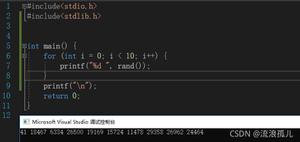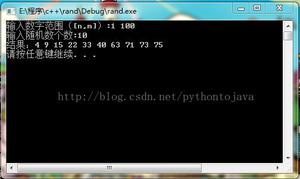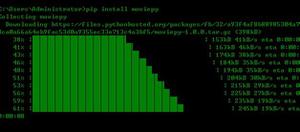python-随机数的产生random模块

random模块用来产生随机数:
查看random模块的方法:
import randomrandom.__dir__
Out[39]: <function __dir__>
random.__dir__() #此方法可以查看某个模块的方法
产生随机数:
产生0~1之间的随机数:
random.random() #此方法只会产生0~1之间的随机数Out[42]: 0.14584365038166225
random.random()
Out[43]: 0.5366296300103158
random.random()
Out[44]: 0.936239179720834
random.random()
Out[45]: 0.09407523351903868
random.random()
Out[46]: 0.4499090927149705
产生随机整数:
random.randint(1,3)#包含数字3Out[50]: 1
random.randint(1,3)
Out[51]: 1
random.randint(1,3)
Out[52]: 2
random.randint(1,3)
Out[53]: 3
############
random.randrange(1,3) #不包含数字3
Out[56]: 2
random.randrange(1,3)
产生随机浮点数:
random.uniform(3,4) #产生整形之间的浮点数Out[61]: 3.7472254465353703
random.uniform(3.545,9.656) #给出浮点数,产生这之间的浮点数
Out[62]: 8.45786901292924
random.uniform(13.545,9.656) # 位置的大小可以互换
Out[63]: 11.45893194445811
从序列中随机选一个元素:
序列可以为:列表,元组,字符串。
random.choice(list("abcdef")) #列表Out[66]: 'd'
random.choice(list("abcdef"))
Out[67]: 'f'
random.choice(tuple("abcdef")) #元组
Out[68]: 'd'
random.choice(tuple("abcdef"))
Out[69]: 'b'
random.choice("abcdef") #字符串
Out[70]: 'f'
random.choice("abcdef")
Out[71]: 'a'
从序列中随机挑选k个元素,返回一个列表,并不改变原序列的值。
d = list("dfgfdgjfdgergg") #l
random.sample(d, 3)
Out[76]: ['f', 'd', 'f']
#注意返回的结果都是列表
td = tuple("dfgfdgjfdgergg")
random.sample(td, 3)
Out[80]: ['g', 'g', 'd']
打乱原序列中值得顺序:没有返回结果,直接更改原序列!
lqOut[95]: ['a', 'b', 'c', 'd', 'e', 'f', 'g', 'h', 'i', 'j']
random.shuffle(lq)
lq
Out[97]: ['i', 'g', 'd', 'c', 'a', 'b', 'f', 'h', 'e', 'j']
以上是 python-随机数的产生random模块 的全部内容, 来源链接: utcz.com/z/387474.html







